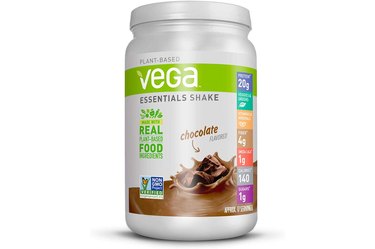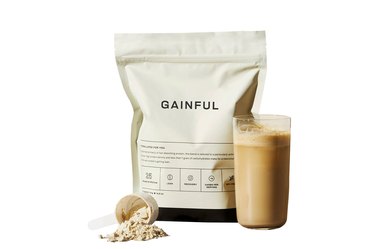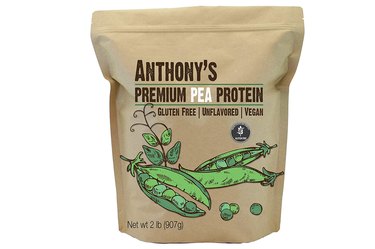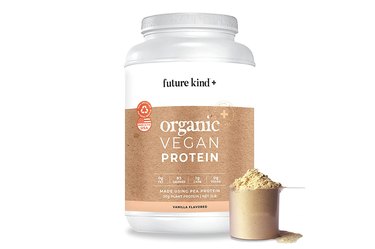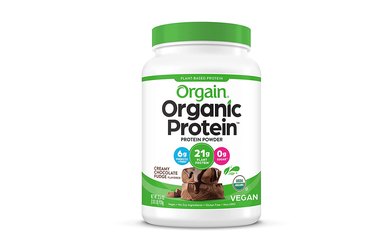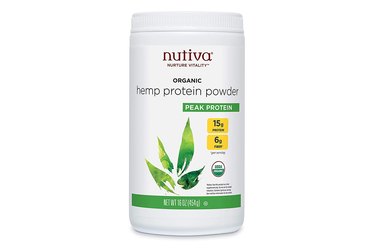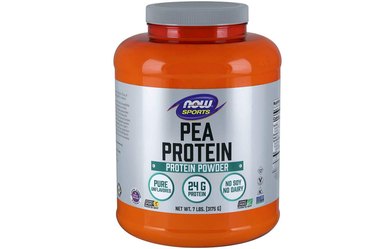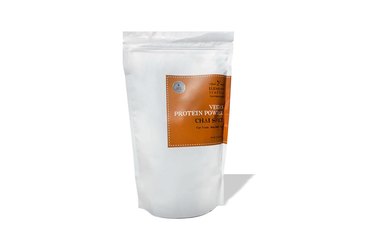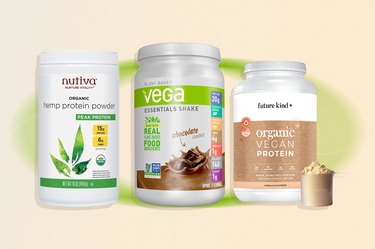
Adding a vegan protein powder to your pantry can help you get more protein in your diet while cutting down on animal products. Plus, just one standard serving (one or two scoops, depending on the brand) of protein powder might just give you many of the nutrients you need for the day.
That explains why the market for plant-based protein powders is expected to continue to grow in popularity, a March 2020 report in Grand View Research shows.
Video of the Day
Video of the Day
If you're trying to adopt a more plant-forward diet, plant-based protein powders can offer delicious convenience — so long as you choose the right one. Below, we share dietitians' top tips for choosing a vegan protein powder and the brands they love.
1. Best Overall: Vega Plant-Based Essentials Shake
Per 2 scoops: 280 calories, 8 g total fat, 12 grams total carbs, 1 g sugar, 220 mg sodium, 20 g protein
This Non-GMO Project verified protein powder is made from pea protein, flaxseed and hemp, and includes broccoli, carrot juice, kale and organic spirulina for added nutrients. This makes it an excellent source of vitamin D and antioxidant vitamins A and C, which help support your immune system.
"Vega is a company that has vegetarians and vegans in mind, so many of their products contain essential nutrients that vegans and vegetarians may miss in their diets like iron, vitamin D," says Cassie Christopher, RD, a dietitian and founder of the Stress Less Weight Mastery.
One serving alone gives you 25 percent of your daily value of 12 vitamins and minerals. And it has all nine essential amino acids.
Of all of the vegan protein powders out there, Christopher believes this one is the overall best because it has a lot of different flavors — including Berry, Caramel, Chocolate, Coconut, Matcha and Peanut Butter — which is great for anyone who is taste-sensitive and/or wants a little diversity in their diet.
Plus, this pick contains different types of vegan proteins for a complete amino acid profile. Bonus: It includes pea protein, which is just as effective as whey protein for post-exercise recovery and building muscle, according to a January 2015 study in the Journal of the International Society of Sports Nutrition.
Buy it: Amazon.com; Price: Starting at $36.99
2. Best Stevia-Free Protein Powder: Gainful
Per 2 scoops: Varies
"One of the best stevia-free protein powders I've come across is Gainful," says Marie Salbuvik, RD, a dietitian and fitness expert.
"They personalize your protein powder depending on your needs and lifestyle."
All you have to do is go on their website, take their quiz and an RD will customize a formula that's just right for you. Each of the powders has only seven ingredients or fewer and contains all nine essential amino acids. Plus, there's no gluten, soy, fillers or artificial flavors, dyes or sweeteners.
Their protein powders come unsweetened, but if you're avoiding stevia, make sure to skip out on the optional Flavor Boosts, which do include stevia.
Buy it: Gainful.com; Price: Starting at $39.99
Per 2 scoops: 90 calories, 2.3 g total fat, 0 grams total carbs, 0 g sugar, 525 mg sodium, 18 g protein
"One tablespoon contains 8 grams of protein and only 35 calories," Salbuvik says, which means this pick is ideal for a calorie-restricted diet. Salbuvik also likes that this protein powder is made with only one ingredient: vegetable pea protein isolate.
A February 2011 study in Clinical Nutrition showed that a calorie-restricted legume-based diet can lead to more weight loss than a similar diet that's legume-free in people with obesity. This may be because pea protein is high in fiber, which is great for keeping you satisfied and your blood sugar levels stable.
Plus, this protein powder is batch-tested and verified gluten-free, unflavored, unsweetened and contains no artificial additives.
Buy it: Amazon.com; Price: $17.49
4. Best Tasting Vegan Protein Powder: Future Kind Vegan Plant Protein Powder
Per 2 scoops: 170 calories, 0 g total fat, 1 gram total carbs, 0 g sugar, 288 mg sodium, 20 g protein
"This is a pea protein powder that actually tastes good," Salbuvik says. "It also mixes well with other ingredients without leaving a nasty aftertaste." Unlike most pea powders, this one isn't chalky or gritty.
It is sweetened with stevia and is soy-free, gluten-free, yeast-free and non-GMO. It also comes in tasty Vanilla and Chocolate flavors and, as a bonus, the eco-friendly bottle is made from 100 percent recyclable material.
Buy it: Amazon.com; Price: $49.99
5. Best Organic: Orgain Organic Protein
Per 2 scoops: 150 calories, 4 g total fat, 15 grams total carbs, 0 g sugar, 290 mg sodium, 21 g protein
This USDA-certified organic powder contains 21 grams of plant protein made from a blend of pea, brown rice and chia seeds. Each serving also has 7 grams of probiotic fiber, and it is gluten-free, kosher, vegan, non-GMO, soy-free and sugar-free.
"Orgain protein powder is a good source of iron, which is an important nutrient for vegetarians as plant-based iron may not absorb as readily as animal-based in the body," Christopher says. "It also has some potassium, which may be helpful for lowering blood pressure.
Buy it: Amazon.com; Price: $26.99
6. Best for Other Nutrients: Nutiva Organic Hemp Protein Powder
Per 2 scoops: 110 calories, 3 g total fat, 8 g total carbs, 1 g sugar, 0 mg sodium, 15 g protein
Made from raw hemp seeds sourced from Canada, this powder is gently cold-pressed without the use of hexane, preservatives, additives or added sugar. It has 20 amino acids (including the nine essential ones), omega-3 and -6 fatty acids and antioxidants, making it perfect for an all-vegan diet.
Approved by ConsumerLab and USDA-certified organic, it also includes a lot of fiber and other micronutrients, such as potassium, iron and zinc. Just one serving provides 15 grams of raw organic protein (specifically, 66 percent edestin, which is an easily digested protein found in hemp) and 6 grams of fiber, which is 21 percent of your daily value.
Buy it: Amazon.com; Price: $13.99
7. Best on a Budget: NOW Sports Pea Protein
Per 1 scoop: 120 calories, 2 g total fat, 1 g total carbs, 0 g sugar, 320 mg sodium, 24 g protein
Made from a non-GMO pea protein isolate, each scoop of this powder has 24 grams of easily digested protein, as well as over 4,200 milligrams of branched-chain amino acids and over 2,000 milligrams of arginine, along with all nine of the essential amino acids.
It's specifically designed for athletes, so it's Informed-Sport Certified, and every batch has been rigorously tested for any banned substances. And it's ConsumerLab-approved.
And, at 35 cents per ounce, you really can't get a better bang for your buck! The only downside: "You will likely want to mix this powder with fruit or cocoa powder as it has a slightly bitter flavor," Christopher says.
Buy it: Amazon.com; Price: $39.55
8. Best Fair-Trade and Sustainable: Elements Truffles Vegan Protein Powder with Immunity-Boosting Chai Spice
Per 1 scoop: 60 calories, 1 g total fat, 5 g total carbs, 0 g sugar, 140 mg sodium, 9 g protein
This vegan protein powder is made with pea protein isolate, cacao powder, a blend of chai spices that includes cardamom, cinnamon, ginger and black pepper as well as monk fruit extract for a dash of sweetness. The powder also has ashwagandha, an adaptogenic herb that is said to help with stress relief.
Each scoop also serves up 2 grams of fiber, which will help keep you satiated along with the 9 grams of protein. After a workout, blend two scoops in your smoothie to get 18 grams of the muscle-building macro.
And you can feel good about purchasing this protein powder: The brand is sustainable and fair-trade, and gives 25 percent of its annual profits to educating underprivileged children in partnership with Care for Children.
Buy it: Bubblegoods.com; Price: $25
How to Pick a Vegan Protein Powder
Look for Third-Party Testing
Christopher suggests checking to make sure the powder has a seal of verification by a third-party testing company, as that "means that a neutral party tested the powder and found that it does indeed include what the powder says it will include."
A February 2018 study by The Clean Label Project found that plant-based protein powders are more likely to be contaminated with heavy metals such as arsenic and lead, so Christopher also recommends looking the brand up on a third-party testing site like ConsumerLab.com.
Opt for Varied Protein Sources
The key to getting all of the different essential amino acids you need on a plant-based diet comes down to eating a variety of plant sources. Blended protein powders, which can include chia seeds, hemp, pumpkin and ancient grains, are a great way to easily get a mix.
"Plant-based proteins on their own are usually not complete proteins," Cristopher says. "A complete protein means it has all nine essential amino acids needed for creating protein structures in the body."
Check the nutritional info to see how many essential amino acids are included, and vary as needed.
Avoid Additives
"Watch out for sweeteners like sugar, sugar alcohols or non-nutritive sweeteners (like aspartame and Splenda)," Christopher says.
She recommends going for unsweetened powders and then adding your own sweetener to your smoothie because then "you will likely end up using less and forgoing the digestive discomfort some of the sugar alcohols and non-nutritive sweeteners can cause."
Tip
It sounds basic, but it's easy to forget that anything that you put into your body should taste good to you!
"Note that added greens can give proteins a grassy flavor, and that pea protein powder on its own really does taste like peas," Christopher says. "I have learned that the hard way."
- DuPont: "DuPont Nutrition & Health Unveils New Research on Plant-Based Eating"
- Grand View Research: "Plant Based Protein Supplements Market Size, Share & Trends Analysis Report By Product"
- Research and Markets: "Global Protein Supplements Industry Outlook to 2025"
- Sports: "The Effects of Whey vs. Pea Protein on Physical Adaptations Following 8-Weeks of High-Intensity Functional Training (HIFT): A Pilot Study"
- Journal of the International Society of Sports Nutrition: "Pea Proteins Oral Supplementation Promotes Muscle Thickness Gains During Resistance Training: a Double-blind, Randomized, Placebo-controlled Clinical Trial Vs. Whey Protein"
- Nutrition Journal: "Effect of Different Protein Sources on Satiation and Short-term Satiety When Consumed as a Starter"
- Nutrition in Clinical Practice: "Nutrition Concerns and Health Effects of Vegetarian Diets"
- Amino Acids: "Protein Content and Amino Acid Composition of Commercially Available Plant-Based Protein Isolates"
- Clean Label Project: "New Study of Protein Powders from Clean Label Project Finds Elevated Levels of Heavy Metals and BPA in 53 Leading Brands"
- Grand View Research: "Protein Supplement Market Worth $32.6 Billion by 2027."
